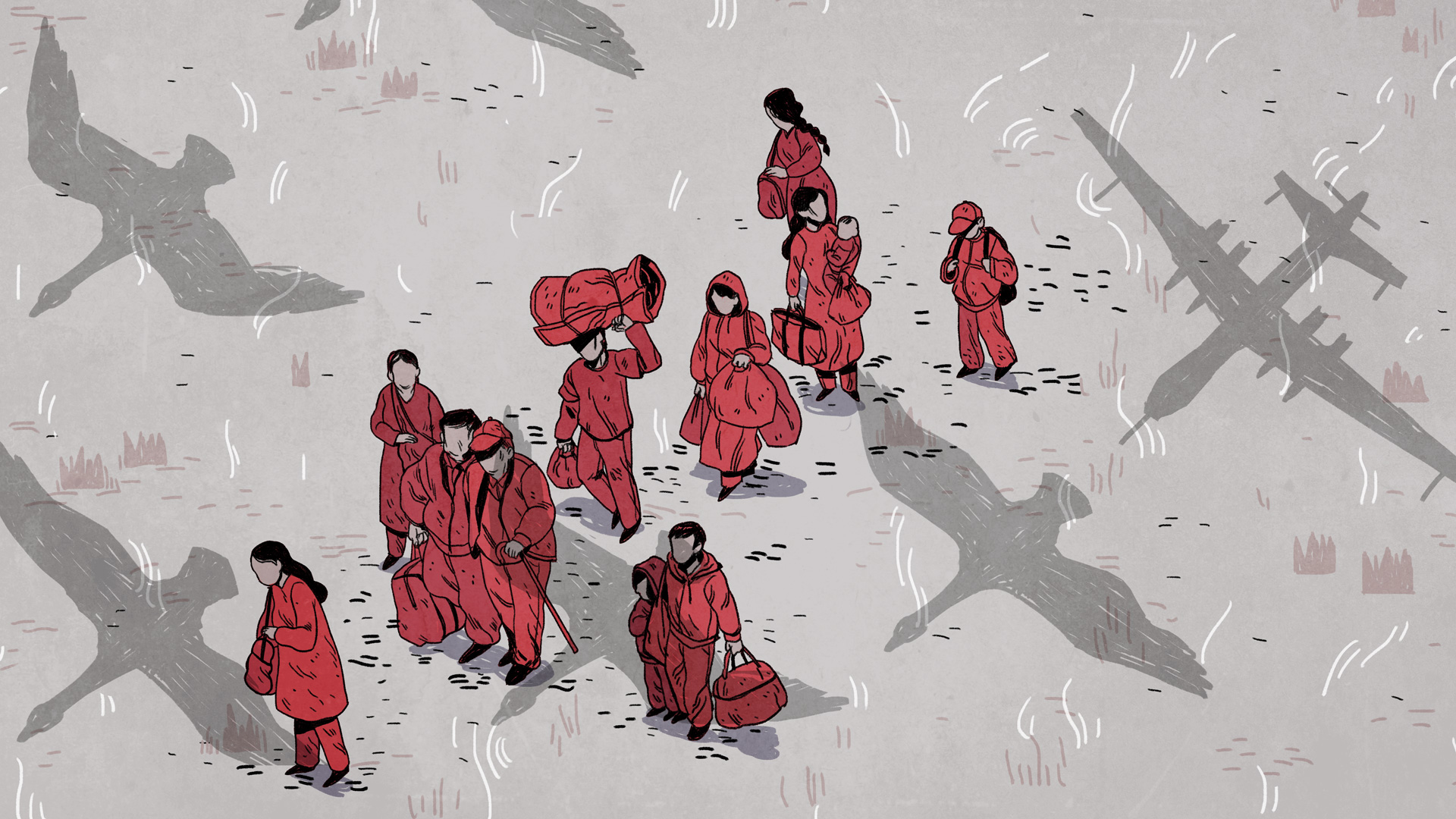“'Exit West' Is a Beautiful Novel About the 'Migration Apocalypse”
By James Yeh, originally published on VICE.com (2017)

Illustration by Deshi Deng
Moving and allegorical, Exit West can be thought of as a kind of refugee love story or, more precisely, a story of how people can be brought together and torn apart by war and forced migration. Set in an unnamed, war-torn city (loosely based on Lahore, Pakistan, where Hamid was born and now lives after stints in California, Boston, and London), the novel opens in an unexpected place: a night class on "corporate branding and product identity." A good-natured, if pensive ad man named Saeed tries to woo a motorbike-riding woman named Nadia who dresses in a long black robe not out of piety but, as she tells Saeed, "So men don't fuck with me."
Sharing an affinity for travel and weed, the two become involved (a nice flip of the script: Saeed is the more devout, chaste-ish one). Meanwhile, fighting in the city intensifies; at one point we see rebel soldiers playing soccer with the decapitated head of an enemy combatant. Soon after Saeed and Nadia decide to flee through a magic door provided by a sketchy, armed middleman. This transports them to a campsite in Greece, then squat in London, eventually ending up in a shanty outside of San Francisco, where they grapple with the immense distances they've traveled literally and psychologically.
Thanks to Hamid's assured, lyrical prose style, the book possesses an epic almost hypnotic quality that's occasionally shattered by startling violence: the shooting of a character's mother, the throat-slitting of a neighbor, "bodies hanging from streetlamps and billboards like a form of festive seasonal decoration." Differently effective are the vignettes of other, anonymous characters in different parts of the world—a sleeping woman in Sydney, a whiskey drinker in Tokyo, an old navy man in San Diego—and their brief yet haunting interactions with migrants, a formal device that points to our shared humanity, seeking out places of belonging and often not quite arriving at them, whatever our nationality.
Although Hamid's authorial voice can lean in thematically at times—declarations such as "When we migrate, we murder from our lives those we leave behind" and "We are all migrants through time" will feel either breathtaking or a bit on the nose, depending on your taste—Exit West is an impressive work as well as a miraculously, refreshingly hopeful one. "The apocalypse appeared to have arrived," Hamid writes toward the end, "and yet it was not apocalyptic… While the changes were jarring they were not the end, and life went on, and people found things to do and ways to be and people to be with, and plausible desirable futures began to emerge, unimaginable previously, but not unimaginable now, and the result was something not unlike relief.
Earlier this month I had the pleasure of speaking over the phone with Hamid about artists' political duties, our collective desires to be useful, and what it was like to explore this "migration apocalypse." The 46-year-old novelist was as effortlessly articulate as he was impassioned.
VICE: How much did you initially set out with a goal of writing a book that might resonate with the current global situation? Was there an instigating incident?
Mohsin Hamid: My novels usually come from a very personal need. And this novel came from the personal need that I'm a mongrelized person. I've spent lots of time in America, in Pakistan, in Britain, and I believe that hybridized, mongrelized people are not a problem, but a good thing. And I was feeling that there were so many currents that were against it. There was a backlash against migrants generally, in rich countries. And so I wanted to write about the tension between those two positions. Between the desire to move, and the desire to not have people move to where you are. Because if eventually it becomes people cannot, we'll become intolerant of diversity, and intolerant of people intermingling in interesting ways. Then the world is fundamentally intolerant of people like me.
It just so happens that these trends that I picked up on, and was responding to, happened to, in the year since I handed in that book, become much more potent in the minds of many other people. I think that the Brexit vote and the Trump election contributed to that. I didn't think either of those things would happen when I handed in my book last March or April. I would have said, "Look, I think that Britain will stay in the EU, and Trump won't win the Republican primary, let alone the US election." But with that said, these underlying forces I thought were going to play out in very significant ways in the coming years and decade. I didn't think it was going to be as quick as it was.
Read more on VICE.com.